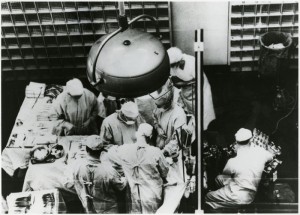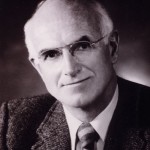Joseph Murray on the First Successful Human Organ Transplant
The current issue of Harvard Medicine features an essay by Dr. Joseph Murray reflecting on the first successful organ transplantation. Murray discusses how his service as an army surgeon during World War II helped influence the direction of his career, as well as describing the procedure and its aftermath. The transplant involved numerous surgical risks, but also raised additional issues:
This list of potential risks posed an ethical dilemma for us. While we routinely asked patients to incur some risk in order to achieve a benefit for themselves, none of us had ever asked a healthy person to accept this magnitude of risk solely for the sake of someone else. We consulted with experienced physicians within and outside of the Brigham, clergy of all denominations, and legal counsel before offering the option of transplantation. The team met several times with the family to describe in detail what was involved for Ronald and Richard. We advised neither for nor against the operation, and we stated the obvious: We could not know if it would work.
Joseph Murray (B.A., 1940, Holy Cross College, M.D., 1943, Harvard) was Professor of Surgery at Harvard Medical School and Chief of Plastic Surgery at Brigham Hospital and Children’s Hospital. He received the Nobel Prize in Physiology or Medicine 1990, for his work on organ transplantation. The Center holds the Joseph E. Murray Papers, 1919-1999. For information regarding access, please contact the Public Services staff.

Joseph Murray (third from left), performing the first successful organ transplant at the Peter Bent Brigham Hospital, Boston, MA, December 23, 1954.
UPDATE: The Harvard Gazette interviewed Dr. Murray about the 1954 transplant as part of a series celebrating Harvard’s 375th anniversary.
